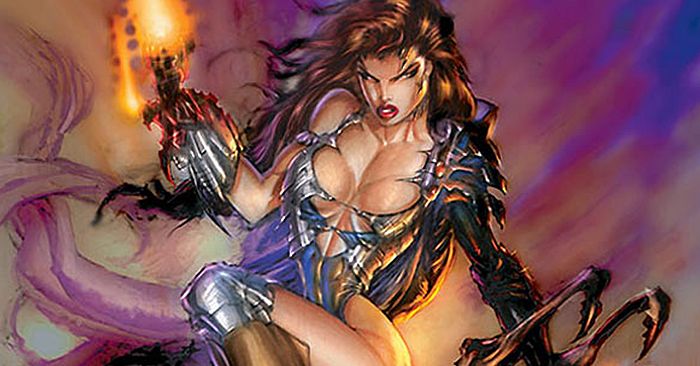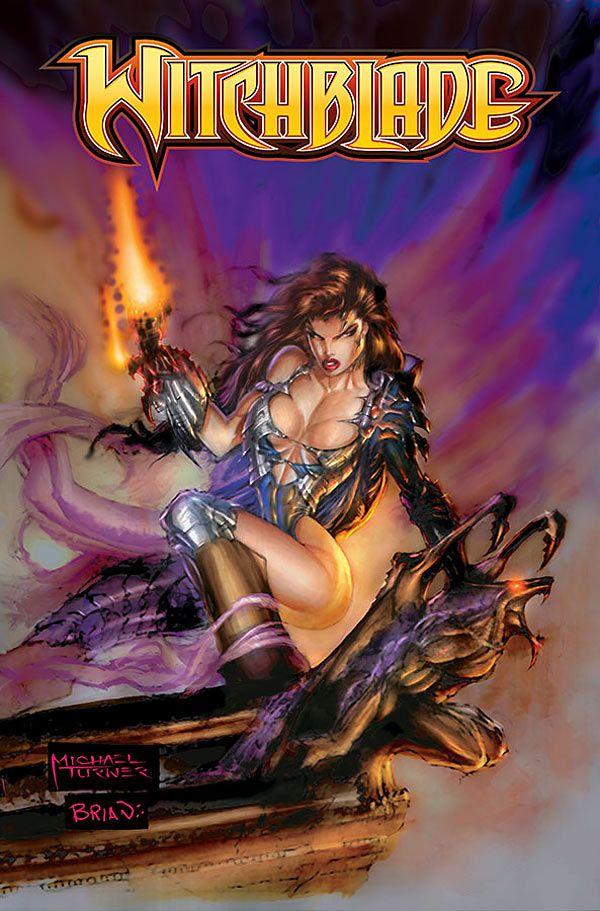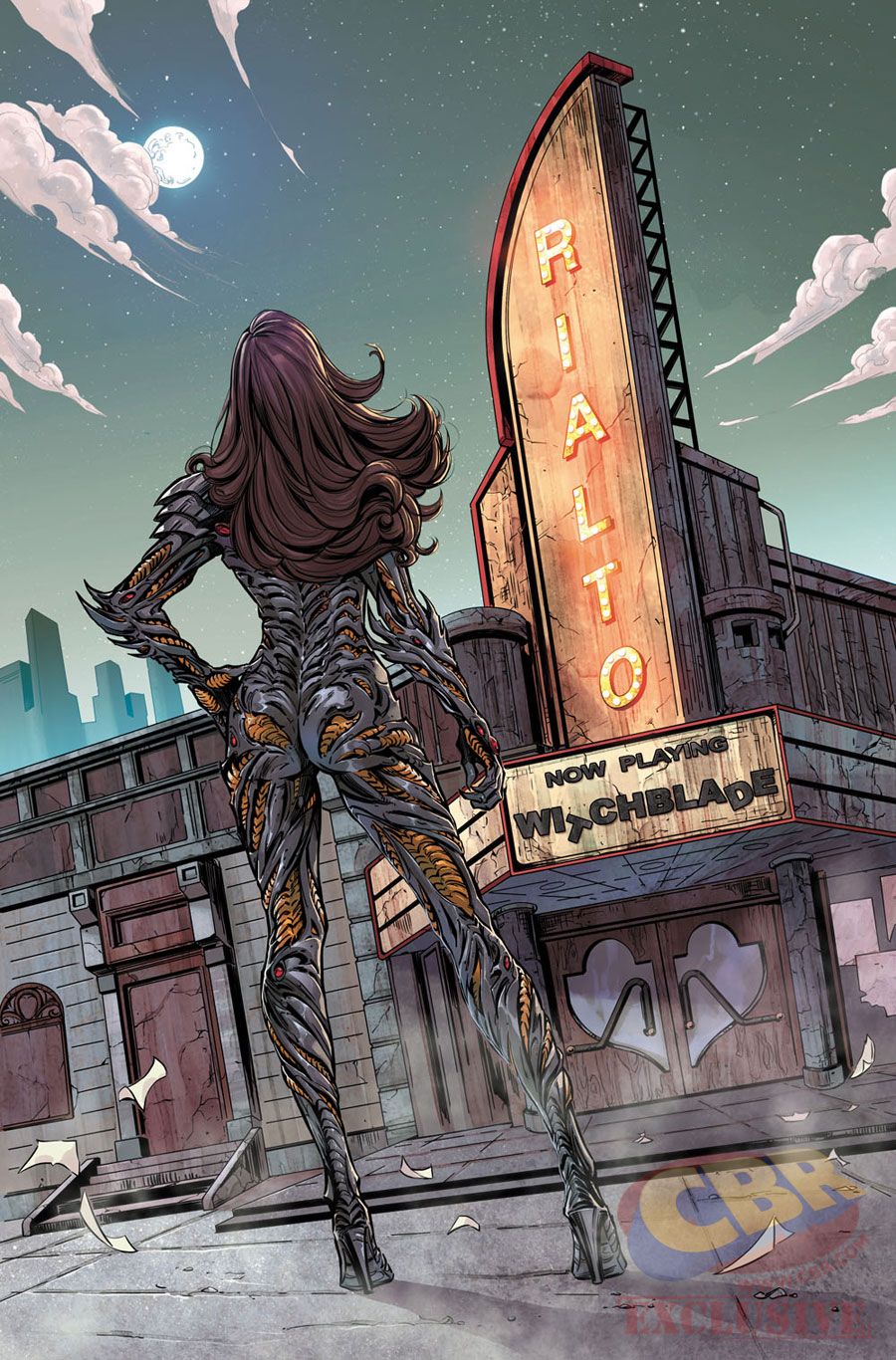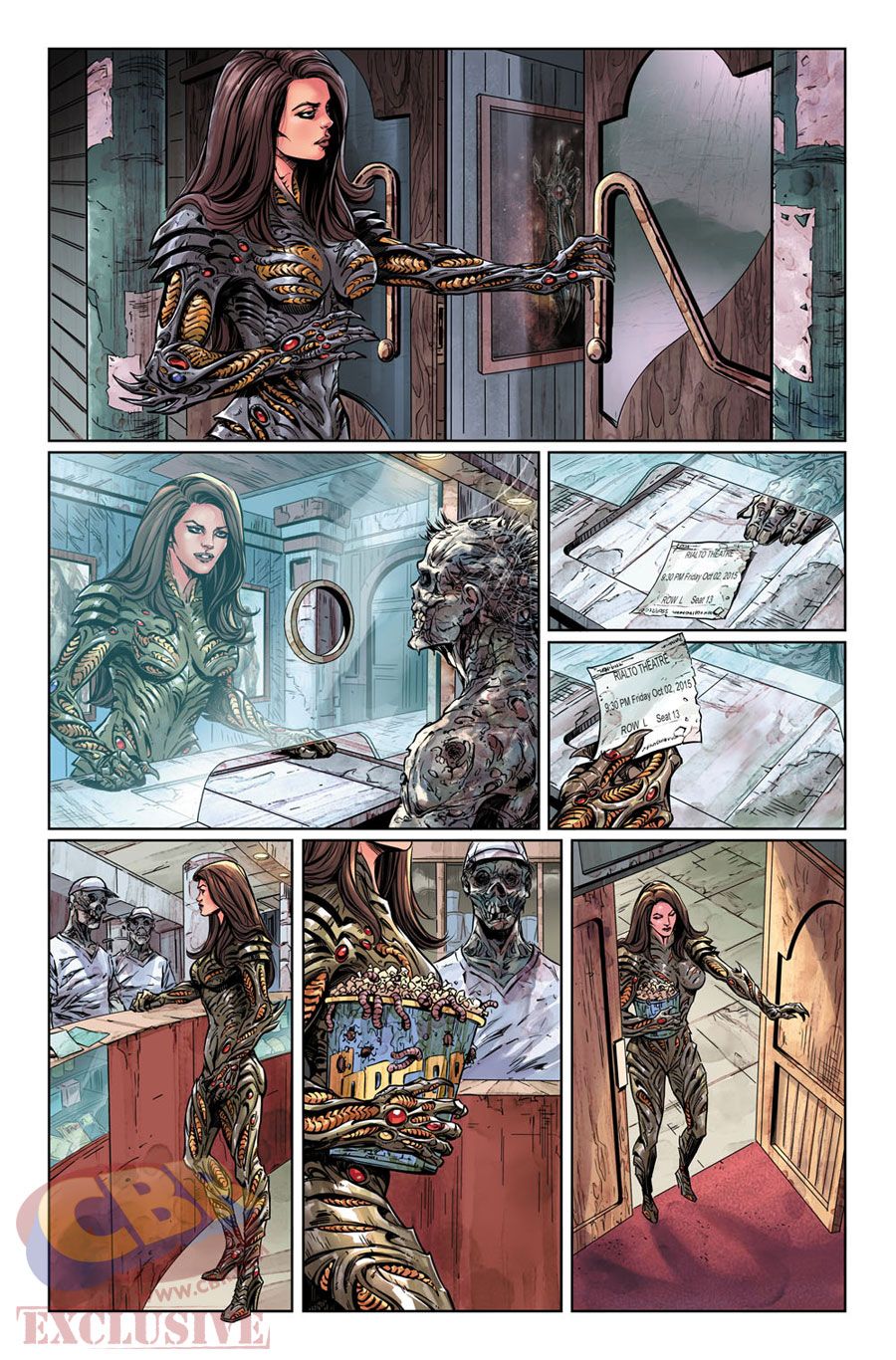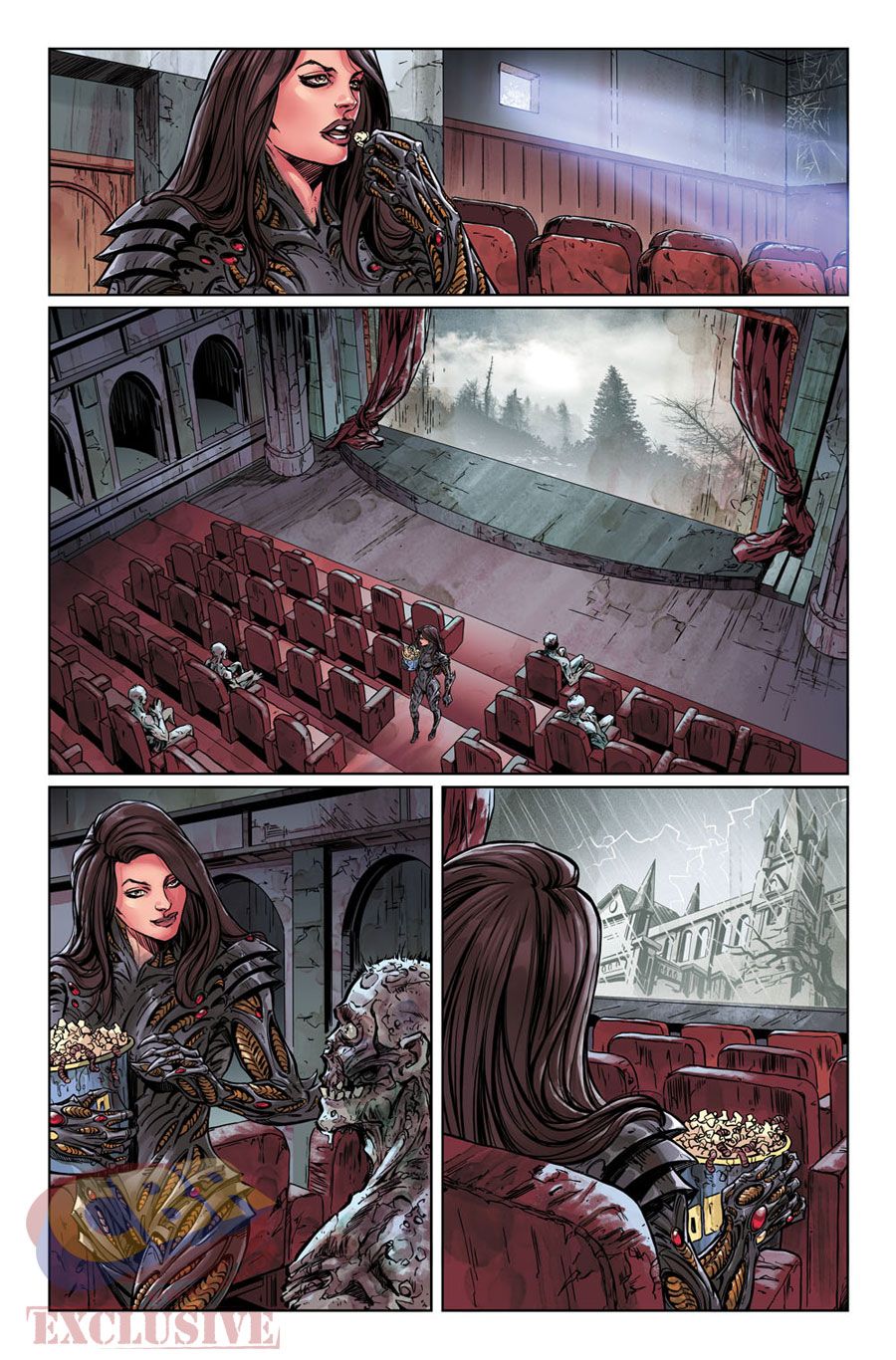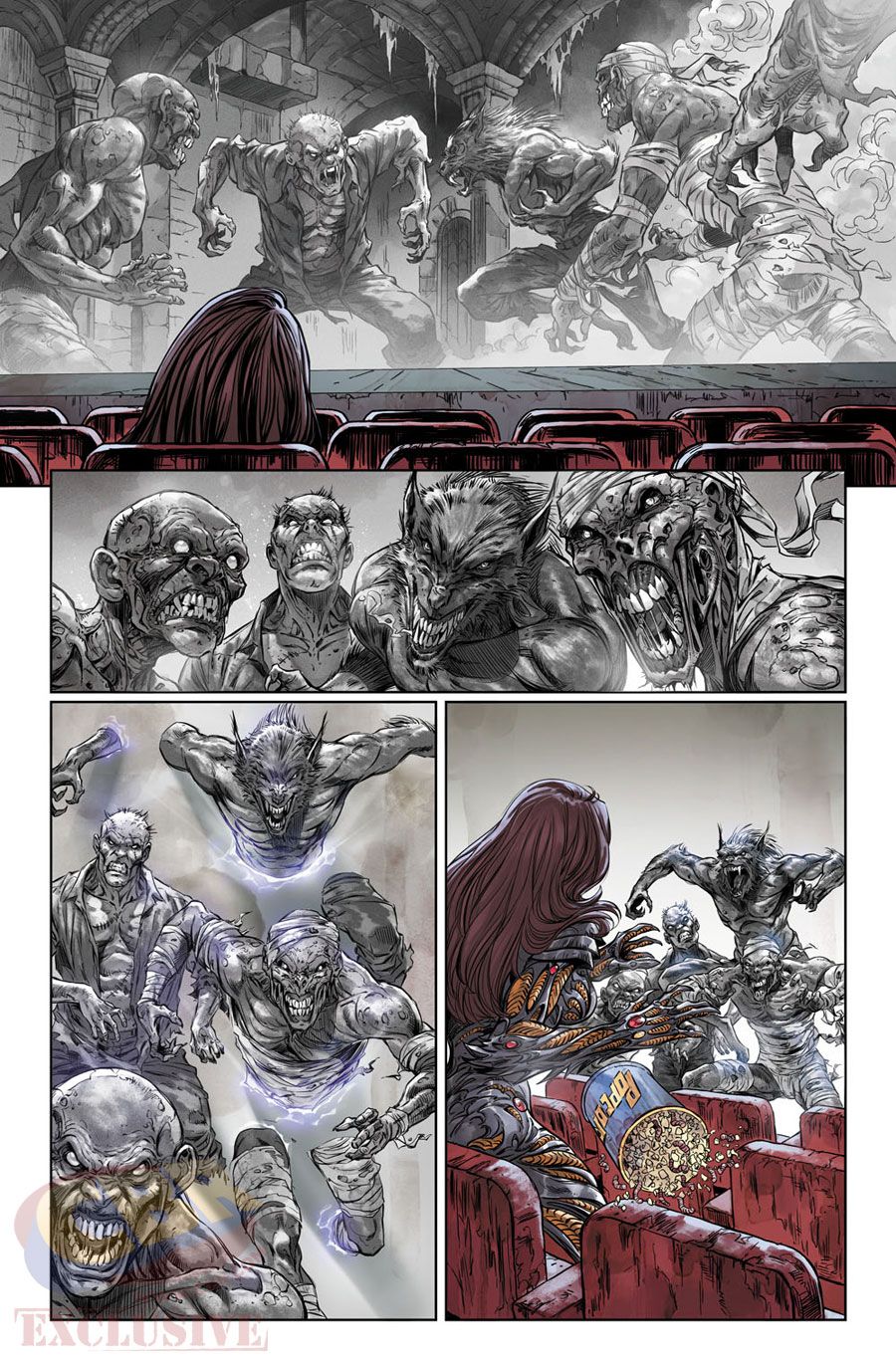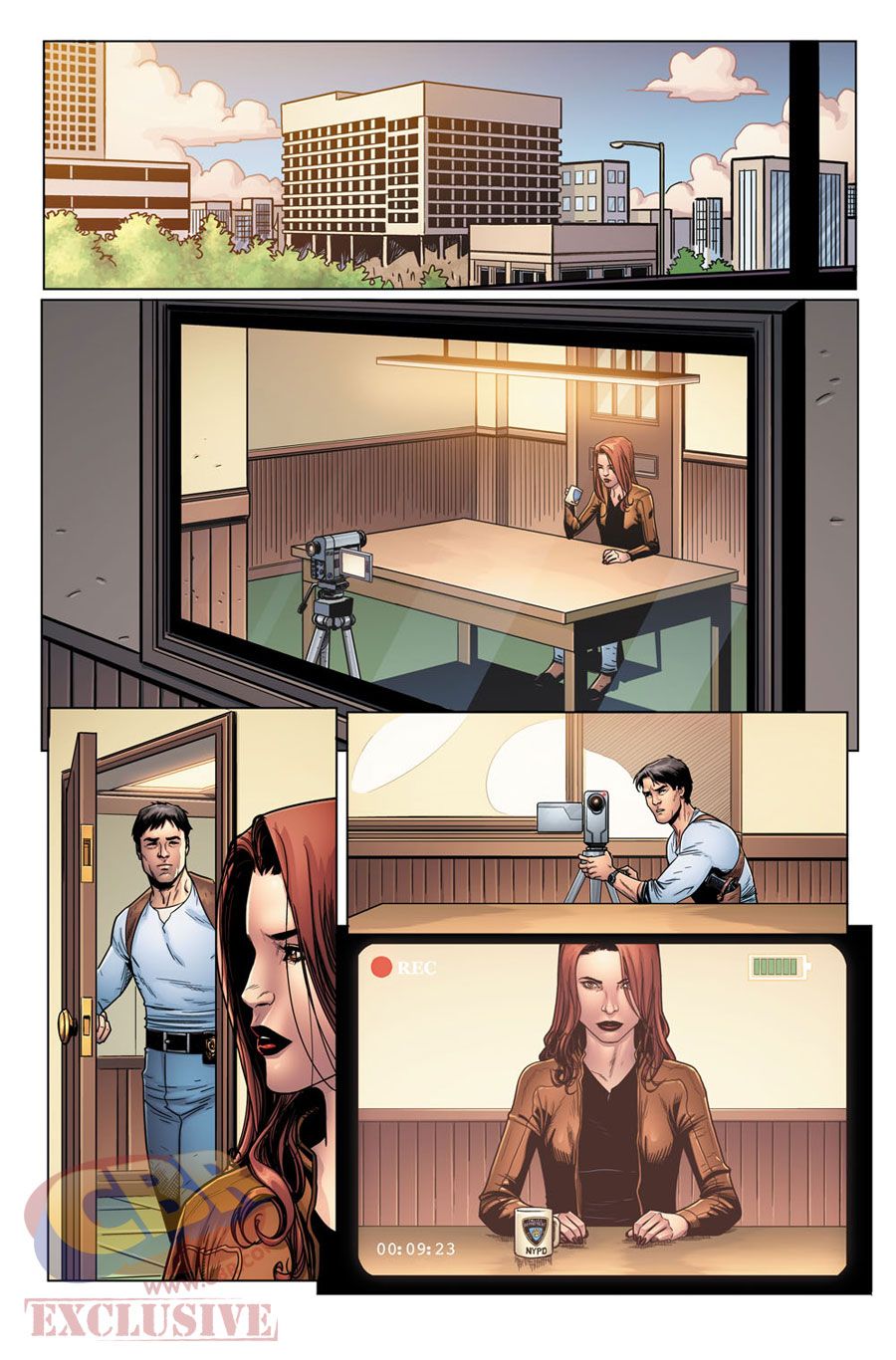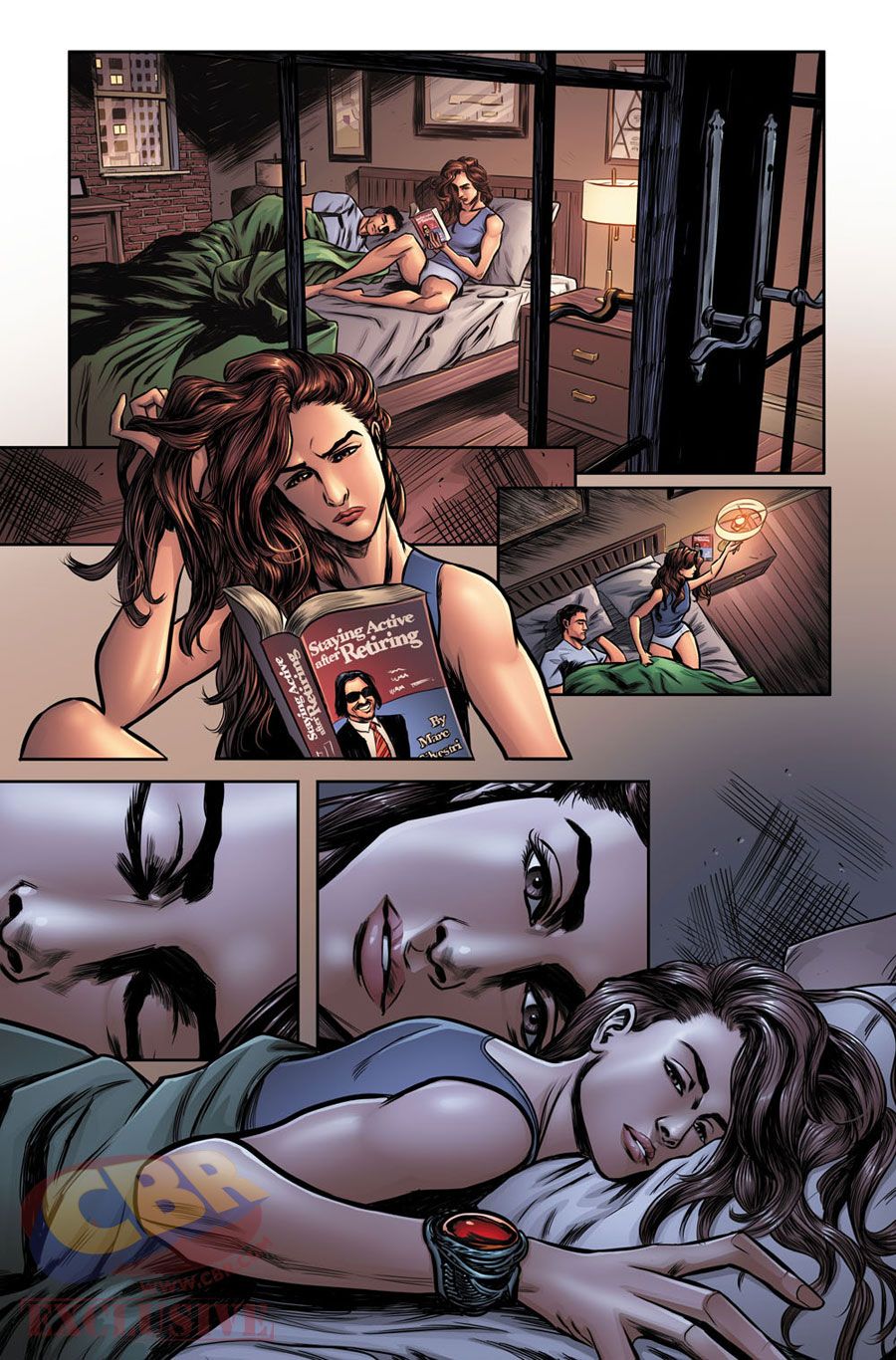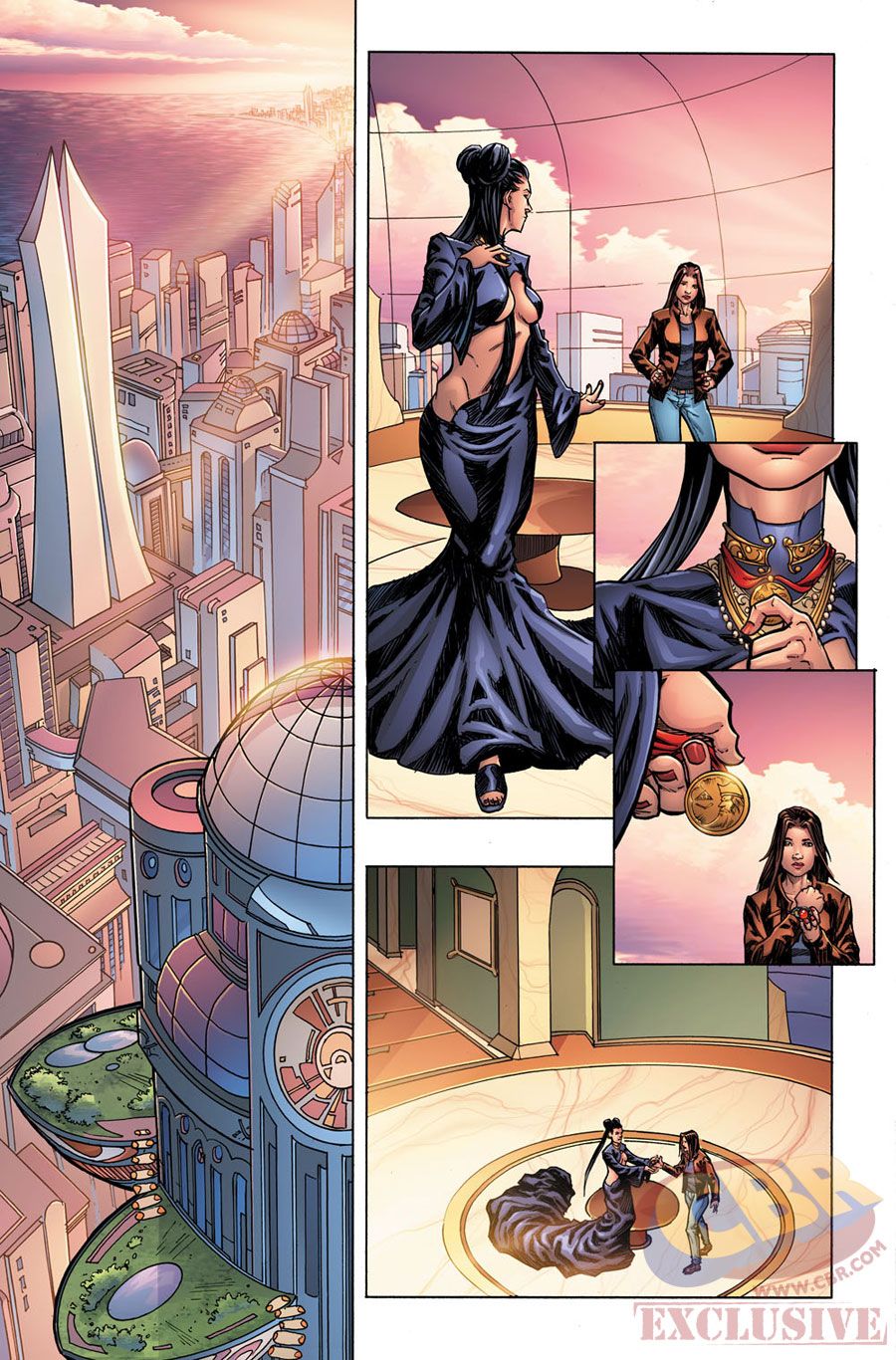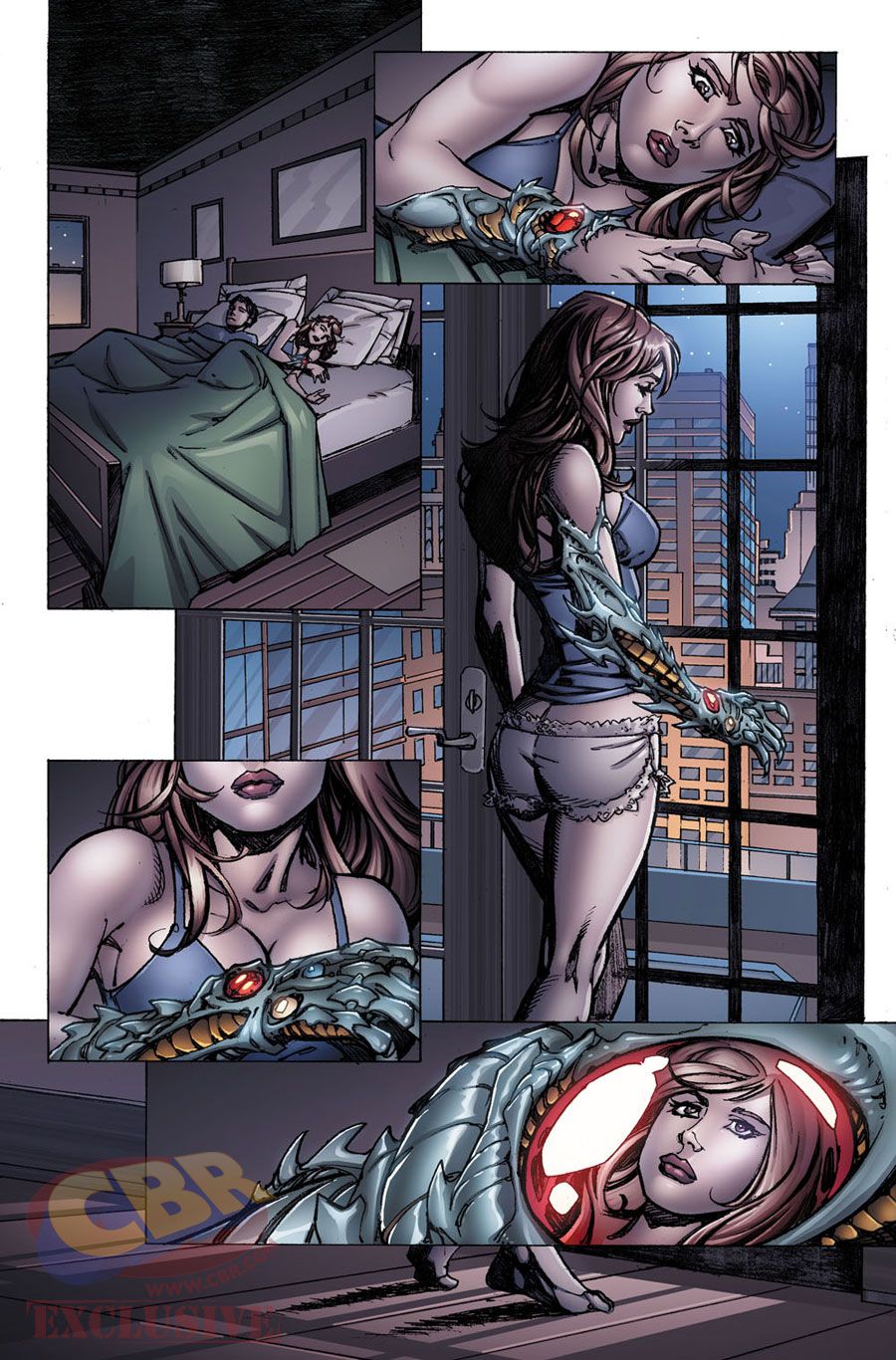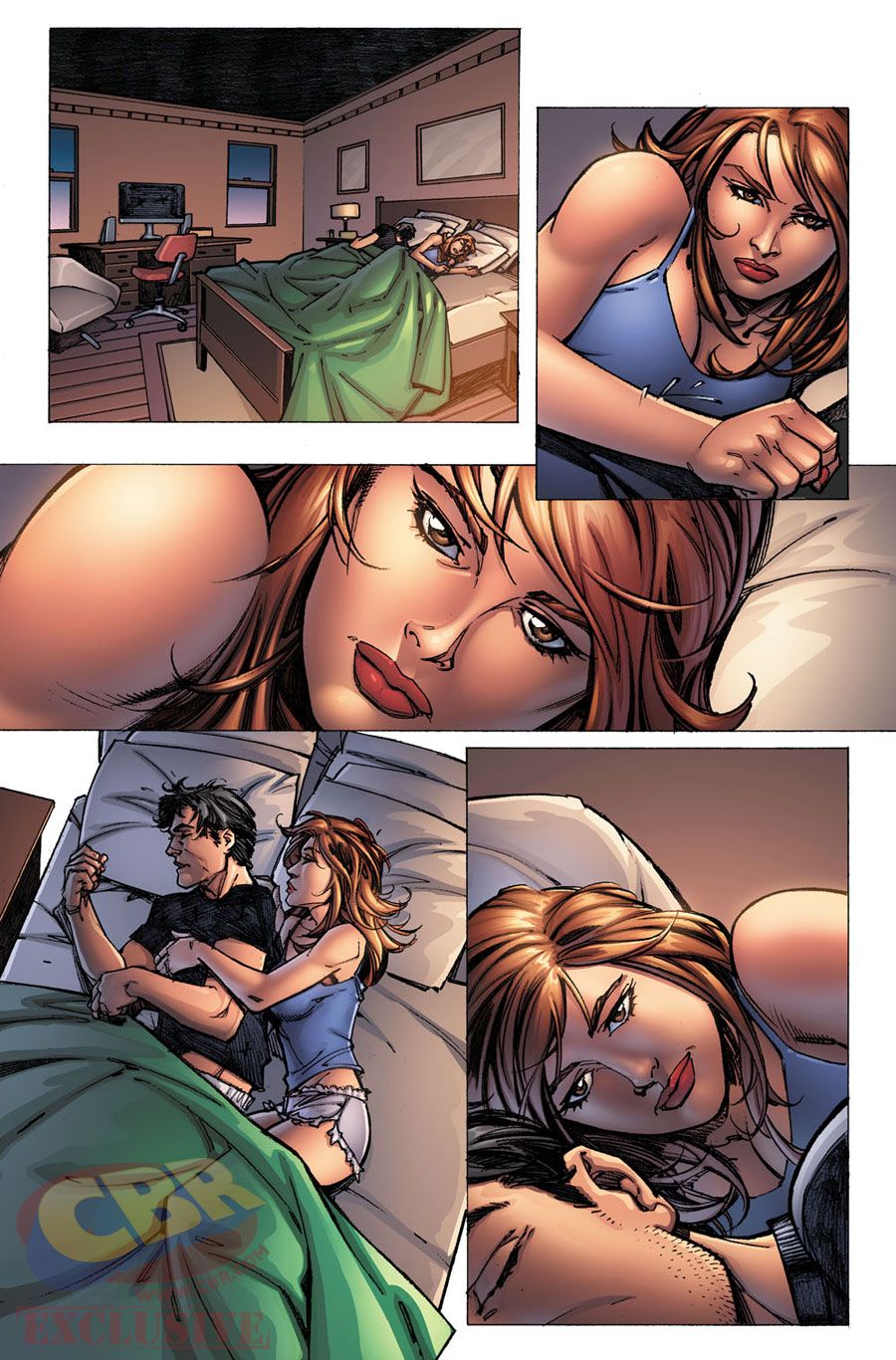Two decades ago, a book hit the shelves from Image Comics' imprint Top Cow. Overseen by Marc Silvestri, previously of "Uncanny X-Men" and "Cyber Force", the comic would go on to run for 20 years, spawn a number of spinoffs -- including "The Darkness" -- and even find its way to television. That book was "Witchblade," and it's coming to an end on November 11 with issue #185.
While Michael Turner, David Wohl and Brian Haberlin worked on the early issues and a variety of writers and artists made their impressions on the book over its run -- but none more so than Ron Marz. His 11 year run on the comic, which began in 2004 with #80, was only interrupted by the 19 issues written by Tim Seeley while the Marz helmed the company's "Artifacts" series. Marz will be on board for the finale in #185, an issue that will also feature a story penned by Silvestri and Top Cow's President and COO Matt Hawkins.
While many of the ongoing story elements from the second part of Marz's run were wrapped up in #184, this last issue will be a farewell to Sara Pezzini as the wielder of the Witchblade. It will also celebrate the past with returning artists Stjepan Sejic, Randy Green, Keu Cha, Nelson Blake II and Brian Ching. The cover will also pay homage to Turner who passed away in 2008.
CBR News spoke with Silvestri, Marz and Seeley about the building blocks of "Witchblade," how important the mix of genres is to the concept and the future of the Top Cow Universe.
CBR News: Marc, what drew you to Ron Marz and Tim Seeley as writers of this book?
Marc Silvestri: Character, character, character! Both Ron and Tim are armed to the teeth when it comes to creating three-dimensional, likable characters. They gave Sara a believable and relatable voice and that is priceless for a book that lives or dies on whether the reader cares for the hero and what happens to them. "Witchblade" has always been about Sara first. If you care about her, everything else falls into place.
And Ron and Tim -- what was the potential you saw in this character and concept that made you want to write "Witchblade"?
Ron Marz: Honestly, when I was offered the book, I had never read an issue of "Witchblade." I knew what it was, but it was not something that was on [my] pull list, frankly. I think a lot of times, the projects that come out of left field and you don't have any preconceived notions about are the ones that end up being the best fit because you take everything at face value and then sort through what works and what doesn't and come up with your best vision for the series.
Tim Seeley: I had read the book when I was a teenager and it was perfectly geared towards me with Sara running around in tiny miniskirts. By the time Ron came to it and I started working on it, the potential I saw was that there was so much stuff in pop culture doing the dark fantasy thing with a strong female lead and mixing detective stuff with dark fantasy. There's the Anita Blake series and "True Blood" doing the stuff that "Witchblade" had been doing for years. To me, it was a perfect opportunity to do that in a comic book and also build on the cool legacy that starts with one of the original, big Image superhero successes.
Marz: In a lot of ways "Witchblade" was before its time in terms of the genre-splicing that it put together. I think the concept of the "Witchblade" series was probably in place before the term "urban fantasy" was really coined.
Seeley: Yeah, for sure. You see stuff like "Dresden Files" come not too long after that, but at the time I don't remember there being something like that on the shelves before "Witchblade" showed up, as far as comic books go. I don't remember seeing the novels like that.
Marc, "Witchblade" has always featured a mixture of crime and supernatural threats. Was that a major part of the concept from the beginning?
Silvestri: Definitely. From the outset, the goal was to bring the Arthurian legend of "Excalibur" into modern times and give a gritty, real, contemporary feel. What was also critical was making it a female lead and really ramping up the supernatural elements. In the world of The Witchblade, Sara's Arthur is surrounded by countless Morgan le Fay's!
Was embracing the genre-splicing and pushing it forward a big draw for you all?
Silvestri: I grew up a fan of sci-fi, fantasy and horror -- not with superheroes -- so for me personally it was never a question to mix all those elements in. Plus it would keep us separate from what Marvel and DC were doing. "Witchblade" was always a team effort, though, so it helped that everyone was a fan of those genres too. Once "Witchblade" got going I pretty much stepped away and let Michael Turner and David Wohl do what they wanted. When you read those early issues, you could really see the creative team was having fun playing in a no-holds-barred fantasy world. I think that enthusiasm for doing something different continued throughout the run of the series.
Marz: I think one of the reasons I stayed on this book as long as I have is that it's a really elastic concept in terms of the kinds of stories you can tell. We did straight crime stuff, we did monster-of-the-week stories that you might see on "X-Files." It really was pretty expansive in terms of what you could do with it. You could do almost flat-out superhero stuff. You could do very dark, psychological stuff. The central aspect of all of this is that you have this really kick-ass female lead right in the middle of everything. The book worked largely because Sara is a really great character and I think the audience, over time, became invested in her, the person.
Seeley: I didn't have a run as long as Mr. Marz, but the appeal to me too was the central character of Sara and this thing where you can do different kinds of crime stories with just a touch of magic and fantasy. Also that you could do stories in the vein of the old Will Eisner "Spirit" where Sara's world is the character and the people who are drawn into it become the story. I set it in Chicago, so I got to play around with a city that I'm very familiar with. For me it was fun to add this new element of Chicago, take these regular criminals and have them deal with the fantasy element and see how it effects their lives. Telling stories about small people is always fun for me and that was something "Witchblade" totally allowed.
Marz: In both of our runs the setting became a really important character. Definitely for mine, mostly set in New York City and then Tim moving it to Chicago, the setting was probably the biggest supporting character -- or at least the most reliable supporting character. Some of the rest of the supporting cast came and went, but the setting was always there. The personality of the location was always there.
"Witchblade" is also a legacy concept with wielders going back through time. Was that another fun element to play with as writers?
Silvestri: The legacy aspect is not just fun from a reader's perspective, but also a nice way to flesh out the universe. I think the fact that the Top Cow Universe has its origins at what is basically the beginning of time is pretty cool. The themes we can play with are literally endless. We're definitely not afraid of the "Big Ideas"!
Marz: I'm a big history buff and I love telling stories that take you to a different time and a different place. In comics you can do that for the same budget that you can to tell a story about two people sitting in a coffee shop in the here and now. There's no special effects budgetary limitations like there would be in film or TV, so every chance I got, I told a story that was set in the past with a former bearer somehow. I think that's one of the more unique aspects to "Witchblade" as a series is that it's definitely a legacy concept and every person who had the Witchblade is probably worthy of having their stories told. There was such a wealth of established bearers and also bearers that we made up as we went. I pushed a few times for some sort of miniseries or project that dealt specifically with past bearers in the series. While I very much felt like Sara was the core of the book and that we were telling her story -- because frankly I thought she was worthy of having her story told whether she had the Witchblade or not -- the ability to go back and sometimes contrast the experiences of former bearers or to have Sara learn those stories and somehow draw strength from those stories was always an allure for me.
Seeley: Same for me. Part of it is exactly what Ron said where you can tell a story about Sara and how she deals with something Witchblade-related by contrasting it with one of the former bearers and the lessons they learned or what they didn't learn. For my run, I wanted her to learn from a person via their story, but actually have to interact with her, so we had Sara interacting with Katarina who was the Medieval Witchblade. Having her moved up to the present and have her adjust to modern society and being a different character than Sara was a great way to tell you something about Sara. For me it was a chance to write a pseudo sequel to "Medieval Spawn/Witchblade" which was a favorite when I was a teenager.
Ron and Tim, you both have written comics where you're the only ones creating the whole universe and big shared universe comics. "Witchblade" is in the middle. Is that a much different experience?
Marz: The attraction of working in the Top Cow Universe is that it's fairly small, fairly cohesive and you're only dealing with a couple decades of history whereas at Marvel and DC you're dealing with a whole lot more in terms of characters and history. The Top Cow Universe is kind of cleaner and sleeker than dealing with a universe that's much larger and more established. It doesn't necessarily mean that it's a better experience; it's just different and I think it's a little easier to get a handle on everything because there are so many fewer stray threads to wade through as a writer. All of what's cannon is pretty easily accessible.
Seeley: The first time I did a multi-book crossover was with Top Cow. We did the "Artifacts"/"Darkness"/"Witchblade" storyline. So that was the training ground for when I went on to do "Batman Eternal" and now "Grayson," where I have a co-writer. For me, that was the college class on how to do it. That's where I learned the thing that I stand by now: no ego, best idea wins. We sat around and hashed out ideas for the Top Cow stuff and everyone was cool with saying, "Nope, that's a better idea. Let's do that instead." Now I try to do that all the time.
What's it like for you as writers of the character to know that Sara is hanging up the mantle of Witchblade?
Marz: For me it's a little bittersweet. On the one hand, 20 years, especially for a female lead book -- which was certainly less common 20 and even 10 years ago than it is now, unfortunately -- I think there's a lot to look back on and be proud of. That it's coming to an end is a little sad because, besides my wife, this is the only woman I've spent 10 years with. There is a little poignancy to the whole thing, but I also feel like it's better to end the series where we want to end it and put a coda on the book rather than just have it dwindle down to nothing and nobody even notices when it's gone. It's better to hopefully get off stage leaving the audience wanting more than to overstay your welcome.
Seeley: I also think that Witchblade is one of those concepts where it may ebb and flow and go up and down in popularity and times might change, but there's no way that this doesn't come back at some point in some other media or as a comic again. Sara's so well-rounded and such an interesting lead that I can't imagine her not coming back in some form. Maybe it'll be long after Ron and I are dead and you'll watch your Witchblade stories on the bio-engineered holo-screen in your eyeball, but she'll always be around. A character that goes 20 years doesn't just disappear. There's a reason they lasted that long.
Marz: Ultimately the concept is cyclical. There's a built-in aspect to the concept that says the Witchblade is passed on to somebody else and has always been so. In a lot of ways, this just makes sense. Eventually, it gets passed on to somebody else, so I guess life imitates art in that sense.
Marc, when did you first start talking about ending this run of "Witchblade"? How did the people around you react when you brought it up?
Silvestri: Matt and I had been tossing the idea around for a couple of years but never pursued it beyond the "what if" stage. Ending a run like "Witchblade" is not something you do on a whim, but we realized that now might be the right time. There was some surprised faces to say the least, but I believe everyone understood the decision and was on board with the plans we have.
Ron, was ending the series part of the plan when you came back on to write "Witchblade" after your stint away?
Marz: No, it developed after I came back. When I came back to the book, the notion was to have Sara in a different setting for awhile, so we did the Upstate New York storyline for the last year and a half. As we were winding that up, the discussion became a little bit more pointed about it becoming time to wind this up. We started to point towards that, but it was not in the planning stage when I sat down to write issue #170.
Can you give fans a preview of what they can expect from the series as it closes out?
Marz: #184 winds up a three-part story of Sara getting back to New York, so that winds up my return to the book in terms of the direction we wanted to go for Sara. Then the last issue is dedicated to Sara coming to grips with the fact that maybe it's time to move on from wielding the Witchblade and the Witchblade coming to grips with the fact that it may be time for Sara not to have it anymore. It's certainly a two-way street in terms of who's making the decision that that relationship is coming to an end.
As you both mentioned, the Top Cow Universe has lots of room for other bearers and other characters to explore. Do you see yourselves returning to play in that sandbox in the future?
Marz: If the opportunity is there, sure. I've had a great time working with Top Cow. It's been a long-term relationship for me and I don't expect that it's over just because "Witchblade" is coming to an end at this time. I've done a lot of work with Top Cow that I'm really happy with and I expect to do more in the future.
Seeley: I think those guys are great, I think the characters are great. I've talked to Matt for years about doing something with the Apparition character that appeared in my run of the book. I've always got this plan in the back of my head that I'd like to do something with her. What Top Cow does now, the stuff that Hawkins is doing, the really interesting, social commentary adventure and high-tech books is a good direction for them, but they built themselves on this Witchblade shared universe so I think that stuff will come back and it'd be fun to work on again.
What kind of void do you see Sara leaving in the comics landscape as she walks away from the spotlight?
Marz: I don't know that I'm the person to answer that because I've been so close to it for a decade that I'm probably still in "can't see the forest through the trees" mode. I would like to be able to say something erudite and intelligent, but I think I've been joined at the hip to Sara for so long that I really don't have the kind of perspective that I would need to have to answer that question. The only thing I can tell you is that I've written a lot of stories with her and could certainly tell more stories with her because her character ended up being a really good fit for me to work with. I'm just thankful that I had the opportunity because, in your career, you don't get that many times where you click with a character and a concept well enough to hang around for 80 or 90 issues and not feel like you're getting stale. I've had a few opportunities like that in my career and any time you get one of those you have to count your blessings.
Seeley: From an outside perspective and a business perspective and what it means for comics perspective, "Witchblade" is an example that paved the way for a lot of Image comics to come. Without "Witchblade" we don't have this really long-running, creator-owned property that is directly a result of a bunch of creators saying, "We don't want to work for the Big Two anymore. We want to make our own thing." Having [an almost] 200-issue run of a creator-owned book is amazing. It's so rare. The only things like it are "Spawn," "Savage Dragon" and "Hellboy." Those are the only ones that have that longevity. It leaves a void and it will be tough [to fill], especially considering how the comic industry works, for someone to come along with another creator-owned book especially one featuring a female lead and have that kind of impact and lifespan.
Silvestri: Sara and the Witchblade hit like a hurricane at a time when there were very few female lead characters in comics, so I think people will notice. The fact that "Witchblade" lead to both a successful live action and animated TV series plus launched "The Darkness" proves the impact of a great concept. These days the idea of a female lead in comics and other media isn't unusual but back then, wow! Then again, the Witchblade is as old as time itself so...
Marc, what's next for the Top Cow Universe?
Silvestri: We have a few tricks up our sleeve! There are lots of new concepts -- and some old friends -- on the table and in production that we're excited about. We live for this stuff and I think the coming year will prove that!
Before moving on to the new Top Cow stories, though, "Witchblade" #185 will offer a coda to this long running series on November 11.

